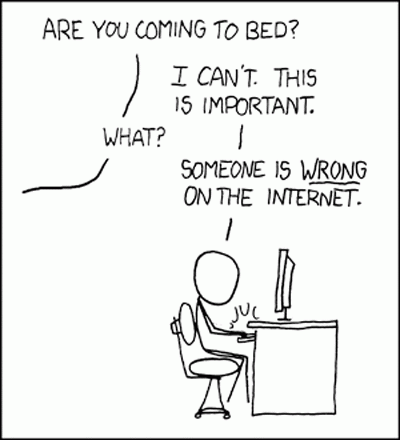The First Step in Hard Conversations — The Year of the Looking Glass — Medium
The First Step in Hard Conversations
You know how it goes. Someone says something that requires a double take. What do you mean? you ask, thinking it must be a misunderstanding. But no. The more you dig, the wider the chasm, until it’s obvious the two of you are so not on the same page you’re reading entirely different books.
Suddenly, the conversation is no longer easy. Suddenly, the person across from you is an opponent, a raging bull let loose in your carefully constructed china shop of plans.
A few months ago, I took a class called Crucial Conversations, based on a book of the same name. It was an excellent class, but memory being what it is, I remember only a few acorns from that day’s cornucopia of wisdom.
This lesson is one of them: Start with Heart.
Ignoring the fact that it sounds triple-cream cheesy, or like what the heroes might yell right before they start pummeling the space invaders in an eight-year-old’s favorite TV show, this little phrase has been a revolution to me. It’s simple, easy to remember, and cuts through an enormous amount of complexity.
Starting with heart means examining your motives and making sure you have a clear picture of the outcome you want before trying to navigate a conflict.
What does that mean? Let’s look at a low-stakes example.
Alice and Bob happen to be sitting next to each other at some flyover city’s airport bar. Bonding over a mutual distaste of the airport’s choice in carpet, they strike up a friendly chat while tossing back a few beers. The topic of conversation meanders lazily — work, vacation hotspots, terrible window seat stories — until it swerves into dangerous territory: politics. It is then revealed that Bob thinks Donald Trump is the best thing since sliced bread, while Alice would like nothing more than for Trump to be revealed for what he truly is: a mop on top of a couple of old hotdogs inside of a tiny mohair sweater.
Brows furrow. Mouths frown. Bob says that politics needs someone with backbone. Alice asks Bob if he’s confusing backbone with asshole. The vein on Bob’s forehead bulges and he wonders aloud if Alice’s taste is to be trusted. He accuses her of loving the Singapore Changi Airport carpet so much she probably had the pattern installed in her living room.
Alice can feel her temper rising as she opens her mouth to lob the choicest Trump insults against Bob.
But here, we pause. What is Alice’s motive? What is the outcome that she wants?
A. Feel powerful and right.
B. Make a Trump supporter feel ashamed.
C. Get Bob to see another side and maybe reconsider his view.
D. Go back to the pleasant chitchat of yore by changing the topic.
E. Leave, because Bob’s company is no longer enjoyable.
Presented like this, C, D and E are rational outcomes, while A and B are not really ends in of themselves. And if C, D, or E is what Alice wants, insulting Bob doesn’t really help with that.

I can’t tell you how many times I catch myself reacting emotionally to a situation —someone is wrong! This plan is idiotic! This thing is horrible! This behavior needs to stop right now!— rather than thinking through the version of the universe I’m hoping to see.
When we react in that manner, we’re making it all about us. We’re valuing our pride, self-righteousness, and personal feelings over how we might usher in a situation that’s actually be better for everyone including us.
In my experience, when I focus on outcomes in a hard conversation, one of two things happens: 1) I find that agreeing to a rational set of next steps is far easier than agreeing we should think the exact same way about something, or 2) I realize that the true outcome I want is not really about resolving the micro-disagreement at hand, but fixing something a level up, like improving the way do things, or building trust in a difficult relationship.
The thing is, when our motivation is self-focused rather than outcome-focused, other people sense that. Our authenticity radar is sharp, while our ability to pretend is much worse than we assume.
That speech you gave which you thought was a clever and subtle way of making yourself sound good? It wasn’t subtle.
That time you pretended to consider other people’s input even though you were already dead set on your approach? They know what you’re doing.
If your heart isn’t in the right place, and your motivation isn’t about how to get to a good outcome, people know. You won’t be trusted, and without trust, what chance do you have of successfully resolving a difficult conflict?
Start with heart.
Take a deep breath. Imagine how you want things to unfold in the best version of the future. Or ask the other person what outcome they’d like to see.
It’s not about being right.
It’s about making the right things happen.
